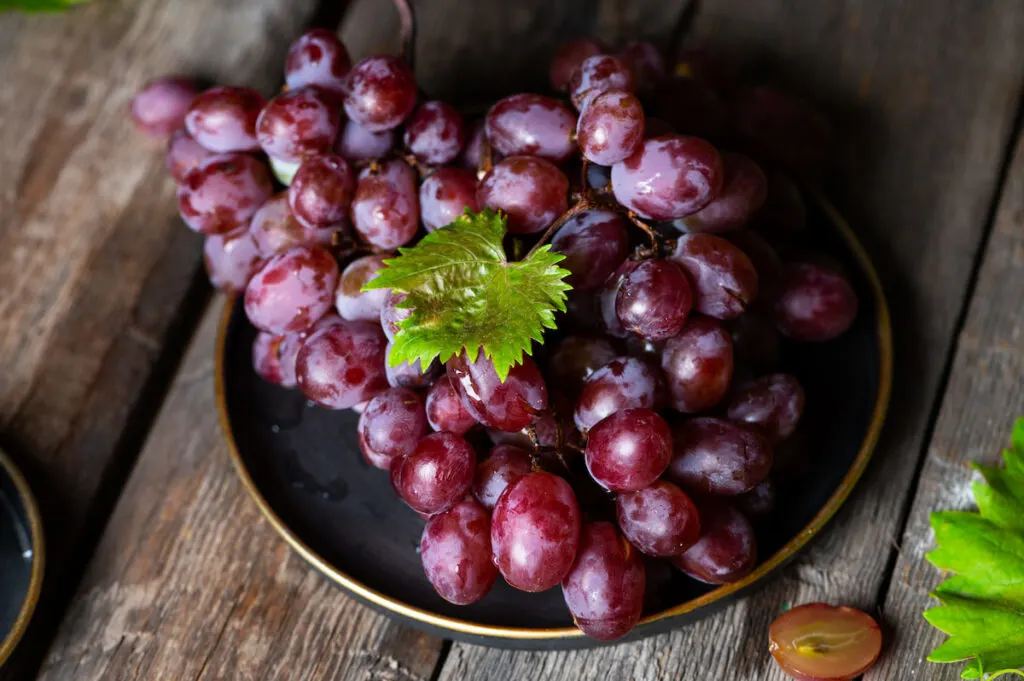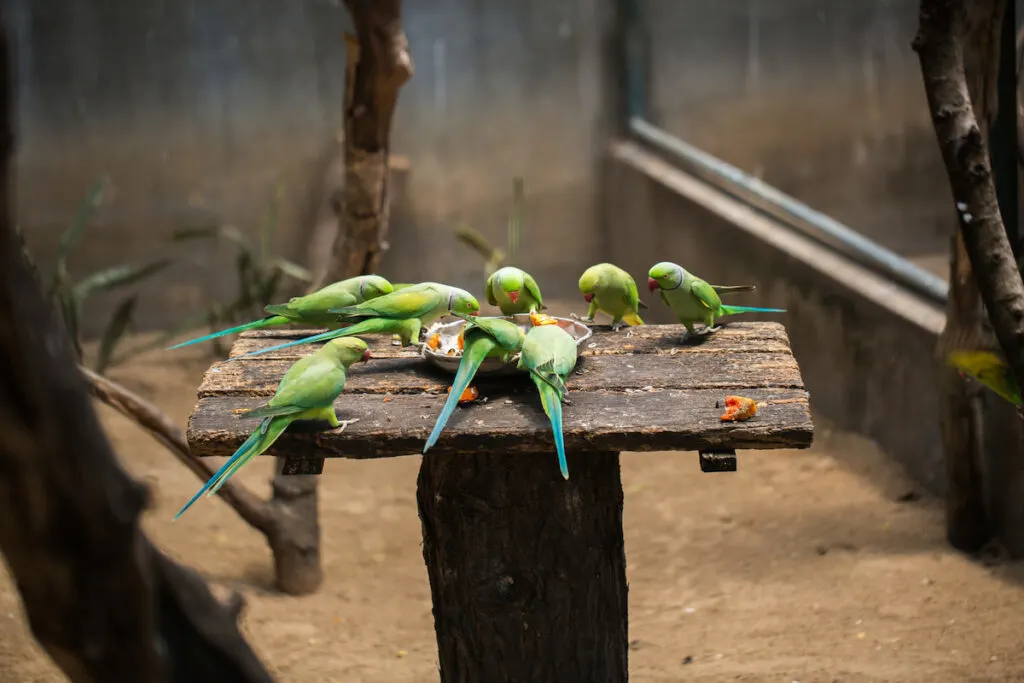Table of Contents
Feeding a Parrot
Parrots are omnivorous birds who often feed on a wide range of diets from their immediate natural habitat, ranging from fruits, plants, nuts, and seeds to worms and small insects.
To keep your parrot healthy, however, you should know which foods to feed your parrots, in what amount, and which to refrain from. There are a couple of foods that can be toxic to your bird, like avocados.
To provide the best and most specific diet for your parrot, it is advisable to know the species of your parrot.
A good rule to follow is to try to replicate the bird’s diet in its natural habitat and keep the feed quantities in moderation for a nutritionally balanced diet.
Parrots love fruits and vegetables. Both foods are rich in nutrients essential for the bird.
Do they, however, particularly love grapes? And are grapes beneficial to the parrots? Let’s find out.

Can Parrots Eat Grapes?
Parrots do eat grapes. Grapes are often a hit with parrots!
You should, however, only feed them as treats, primarily for two reasons. First, grapes have high fructose content, and overfeeding could be detrimental to the bird’s health.
You should also avoid giving them as part of the parrot’s daily diet because they are very sweet, and parrots have a sweet tooth. They may only pick out grapes and leave the more nutritious feeds, which can lead to vitamin deficiencies if uncontrolled.
It is also known that grapes are prone to chemical contamination from pesticides. For birds, even a small amount of toxins and chemicals could be lethal, especially to smaller birds. It is therefore advisable to thoroughly wash your grapes before giving them to your birds.
Are Grapes Safe for Parrots?
Grapes are safe for parrots to eat. They are very sweet and the only reason for concern is the high fructose content that may make your parrot overweight or develop other issues if overfed.
It is best to feed the grapes in small amounts and in moderation, say about 1 or 2 grapes once every 2 or 3 days. This will ensure the bird gets the necessary nutrients from the fruit without neglecting other nutritious feeds.
The safety of grapes also depends on how they are grown. The possible sources of toxins are external factors like chemicals from pesticides that may stick on the wax on the fruit, or maybe absorbed by the plant, and end up in the fruit.
Even a small amount of pesticides can be fatal to a parrot, and so using organic food sources is a good option to evade this problem. Thorough washing of the fruit to clean off chemicals is highly recommended before giving them to the birds.

Nutritional Benefits
Grapes are highly packed with vitamins and nutrients including vitamin C, water, protein, carbohydrates, fiber, potassium, manganese, and fat that are beneficial to the parrot.
You should, however, avoid overfeeding your parrot because too much consumption may lead to vitamin deficiencies and obesity.
Let’s have a more detailed look at how these nutrients are beneficial to the parrot.
Antioxidants
Mainly found in the skins and seeds, grapes are rich in antioxidants that help the parrot’s body maintain good heart health, and fight free radicals that may cause long-term complications like cancer.
Grapes are rich in resveratrol, an antioxidant that helps inhibit atherosclerosis, or hardening of the arteries, helping to maintain heart health.
Polyphenols are also partly responsible for boosting HDL levels and subsequently boosting heart health. At the same time, they reduce inflammation in the bird’s body.
Dark-skinned grapes are particularly rich in antioxidants like anthocyanins, flavonoids, stilbenes, and others that are significantly important in fighting free radicals and reducing the risks of certain types of cancer.
Potassium
Potassium is an essential mineral for your parrot’s wellbeing. It is responsible for hormone and bone development and regulating heart activity by maintaining healthy blood pressure levels. This improves the longevity and quick recovery of wounds and injuries.
Together with the low levels of sodium, the high concentration of potassium in grapes aids in maintaining a good electrolyte balance and eliminates excess water and other toxins from the parrot’s body.
Potassium is also responsible for glucose processing and metabolization of proteins.
Fiber
Grapes are rich in both soluble and insoluble fibers. When processed, the soluble fiber is converted into energy for the bird.
Upon entering the gastrointestinal tract, the insoluble fiber retains water and maintains the bulk in the stomach, stimulating the stomach and intestines, therefore maintaining healthy bowel movements.
Vitamin C
Among other vitamins, grapes contain an impressive amount of vitamin C. As an antioxidant, vitamin C boosts the bird’s health and immunity by fighting off free radicals that may be responsible for various diseases.
Vitamin C is also responsible for the development of bones, connective tissue, muscles, and blood vessels. It partly aids in the production of red blood cells, too.
Vitamins cannot, however, be stored for long periods in the body, making it necessary to continuously provide them to the birds through their diet.
Manganese
This mineral is essential for bone development and the overall growth of the parrot.
For breeders, this mineral is essential for healthy reproduction and the formation of healthy and normal eggshells.
Protein
Proteins found in grapes help improve the photoreceptor cells in the retina by raising the levels of protective proteins and lowering the number of inflammatory proteins in the retina, boosting eye health and vision.
Red Grapes?
Red grapes are moderately good for your parrots. Their skin is rich in anthocyanin, an antioxidant that helps strengthen the parrot’s cells and slows the aging effects and symptoms.
Green Grapes?
Green grapes are a sweet treat, but because of the low concentration of antioxidants, this makes them a step below the other grapes.
They are, however, famed for their smooth texture and gentle flavors.
Grapes with Seeds?
Grapes with seeds are also good for your parrot. The seeds are loaded with antioxidants and beneficial nutrients for your bird. The parrots also enjoy tackling the grape seeds.
Can I Feed Grape Peels to Parrots?
Grape peels are good for your parrots. The only concern with them, however, is the levels of contamination from pesticides and other chemicals that may be on the surface of the fruit.
Grapes have a waxy coating on the fruit that protects them from harmful bacteria and fungi while still in the garden. Pesticides and other chemicals in fertilizers may, however, stick on the wax.
Because of this, it is necessary to thoroughly wash the grapes to clean off pesticides stuck on the fruit surface.
However, washing may not remove all the chemicals, and so to avoid the risk of pesticide poisoning altogether, you may consider removing the peels before feeding them to your birds.
Effects of Overfeeding

When feeding a parrot, it is advisable to replicate the bird’s diet in the wild, which essentially, means feeding the bird in moderation.
Grapes are sweet and nutritious, and parrots love them. They do not, however, provide all the nutrients the bird needs, and overfeeding, either in one instance or over a prolonged time, is not good for the bird.
Grapes have a high fructose content and too much of it would result in obesity, and this can be life-threatening for your parrot.
Excess feeding and negligence of other feeds will also result in serious cases of vitamin deficiencies for the bird.
Can I Feed Grapes to Baby Parrots?
You can feed grapes to baby parrots. Grapes are highly nutritious and are certainly beneficial to your baby parrots.
You should, however, be careful not to overfeed them because of the high fructose content that would be detrimental to the young parrot if fed in excess.
You should also chop the fruit into smaller pieces and separate the seeds from the fruit because their digestive system may not be developed enough to handle the seeds. This simple practice also helps the little parrot avoid choking when swallowing.
Other Birds That Love Grapes
Grapes are a sweet and attractive treat, not only for parrots, but also to other birds including catbirds, bluebirds, robins, mockingbirds, tanagers, grosbeaks, woodpeckers, towhees, and waxwings.
Conclusion
Parrots love grapes, but this sweet fruit should only be fed in moderation, only as a treat, and not as part of their daily diet.
Grapes are common in the wild, and you should discourage your parrots from eating them right off the vines to avoid overeating.
It is a good practice to cut the grapes into smaller pieces to make it easier for the bird to ingest them.
Resources
- https://animalhype.com/birds/can-parrots-eat-grapes/
- https://www.parrotwebsite.com/can-parrots-eat-grapes/
- https://www.herebird.com/what-do-parrots-eat/
- https://www.allaboutparrots.com/do-parrots-eat-grapes/
- https://www.whatbirdsareinmybackyard.com/2020/01/fruits-you-should-be-feeding-backyard-birds.html
